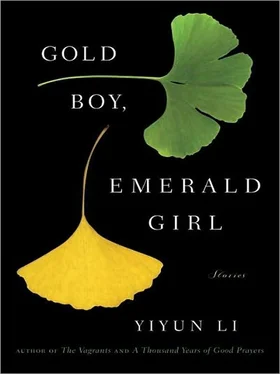The waitress came to offer a fresh pot of tea. Hanfeng turned to Siyu and asked her if she was ready to leave. They had spent almost an hour talking, and he had fulfilled his mother’s wish without humiliating the woman with his lack of interest. Siyu looked out the window at the willow trees, their branches waving like unruly hair in the wind. Not a great day for a walk, Hanfeng said. Siyu agreed, then asked him if he needed a ride.
“I’ll take a cab home,” he said.
“I’m driving past your mother’s place, in any case,” Siyu said. Her own flat, a small studio that she rented from a retired couple, was only minutes from Professor Dai’s flat, but Siyu thought she would appear too eager if she mentioned that.
Hanfeng wished that he had made up an excuse — a lunch with a friend in another district; an exhibition or a film to see — but it was too late to correct himself now.
A WEEK LATER, Hanfeng’s mother asked him if he planned to see Siyu again. They had finished their breakfast and were reading that morning’s newspapers, plates and bowls scattered on the table between them. Hanfeng’s mother did not raise her eyes from the page as she asked, but he knew the question was not as haphazard as it seemed. Should he? he replied.
“Do you dislike her?”
It took more than an hour over tea for him to say that he disliked a woman, Hanfeng thought, but he just shook his head slightly. He was not surprised by his mother’s question. Do you dislike piano? she had asked, when he wanted to give up the instrument at twelve for games that he could play with boys his age; Do you dislike engineering? , when he thought of pursuing a literature degree in college rather than the one she had chosen for him. Before he left China, she told him that she might not have been a good mother in the worldly sense, but she considered herself successful in having given him two things: practical skills with which to earn a living, and music as the only trustworthy companion and consolation for his soul. Twenty-three, and in love with a childhood friend who was dating a chirpy girl, Hanfeng did not believe that either of his mother’s gifts would in any way contribute to his happiness. America, at first glance, seemed a happy enough place, and when his friend called with the news of his engagement, Hanfeng sought out companions. All he wanted was to have some fun, he replied when more was asked of him; “have fun”—wasn’t that the phrase that replaced words of farewell in many Americans’ lexicon? But eventually the reply came back to taunt him: I thought we would have some fun and that’s all, his last lover had said, a Chinese boy, a new immigrant, as Hanfeng himself had once been, whom Hanfeng had helped support through college.
He should ask Siyu out to a movie, his mother suggested, or a concert. When he showed a lukewarm reaction, she said, “Or ask her to have dinner with us here.”
“Wouldn’t that be too quick?” Hanfeng said. Even though Siyu had been introduced to him by his mother, a dinner invitation, after meeting only once, seemed to imply an approval of sorts from both him and his mother.
“She is not a stranger,” his mother replied, and proceeded to check the calendar on the kitchen wall. Saturday was a good day, she said, and when Hanfeng questioned Siyu’s availability at such short notice, his concerns were dismissed. “She’ll rearrange her schedule if she has to,” his mother said, and wrote down the date and Siyu’s number on a piece of scrap paper.
Hanfeng wondered if Siyu had felt similar pressure from his mother. What would she have said to Siyu —I would like you to date my son? Knowing his mother, he wondered if she had simply mentioned that her son needed a wife and that she thought Siyu would be the right person for the role. “Why has she never married?” he asked.
“I imagine for the obvious reason of not having felt the need to get married.”
“Does she want to get married now?” Hanfeng said. He had expected his mother to reply that Siyu had not met the right person — and then he could have questioned why his mother thought him a good choice for her.
“She didn’t say no to the date last time, no?”
When Hanfeng called Siyu to invite her to dinner, the line was quiet for a moment. He waited for her to find an excuse to turn down the invitation, or, better still, to tell him that she had obliged his mother with their last meeting and the sensible thing to do now was to make their mutual disinterest known to his mother. Instead, Siyu asked him if they could possibly meet once more before the dinner. Anytime after she got off from work would do, she said. He wondered why she needed to see him when all could be settled on the phone, but he agreed to a late-afternoon meeting that day.
There was a power outage at the coffee shop where Siyu had suggested they meet. Apart from the light of a few candles on the counter, the inside of the shop, a long, narrow rectangle, was almost pitch-black. Siyu, who had arrived a few minutes earlier and taken a seat by the only window, explained to Hanfeng that the place was always quiet, and more so today, as the coffeemakers were not hissing. A sulky young girl placed a pot of tea and two cups heavily on the table. Siyu apologized for the shop’s unfriendliness after the girl returned to the counter. “I’m about their only regular customer, but for three years no one has acknowledged me,” she said.
“Why do you still come here?”
“It’s quiet. I can assure you it’s not easy to find a quiet place like this in Beijing,” Siyu said. “My theory is that the proprietress is a rich man’s mistress. She does not want the shop to make money for him, and he cannot close it, because it was his present to her.”
Hanfeng looked around, but no one was there besides the girl at the counter. “They seem to hire unhappy people,” he said.
“The proprietress is a beautiful woman,” Siyu said. Hanfeng nodded. He had no further questions, and she could see that he was one of those people who would not return to the place. She wished she could tell him that, apart from the beauty of the woman who once in a while showed up at the coffee shop with an air of authority, there was little evidence to support her guess. Yet there had to be an explanation for the sad, lifeless appearance of the shop. She thought of telling him this, but he was part of the world that did not seek her explanations. The world had made up its mind about her oddity in her spinsterhood.
They sat in silence for a moment. In another place, a more romantic setting, lovers’ murmurs would have been well masked by soft jazz coming from hidden speakers, their faces illuminated by candlelight, but here there was no music and the candles were lit out of necessity. The idea of getting to know Hanfeng better before having dinner with him and his mother seemed, like all the other ideas that had occurred to Siyu, a regrettable mistake. When he did not help find a harmless topic of discussion, she asked him if he was aware of his mother’s wish to see him get married.
“I suppose all mothers worry about their children’s marriage status,” Hanfeng said vaguely. He had thought that his mother had long ago accepted who he was; when he had visited in the past, she had never pressed for any details of his American life, sparing him the pain of explaining himself. “Doesn’t your mother?”
She had no right to feel let down, Siyu thought. Nevertheless, it disappointed her that Professor Dai had not told him much about her. That she had been raised by her father was, from a young age, the first thing people said of her. “I never met my mother,” she said. “My father brought me up by himself.”
Hanfeng looked up at her. Before he could form an apology, she said there was no need for one. She had grown up not knowing her loss, so there had not been any real loss. She wondered if that was how Hanfeng thought of his father. Professor Dai had never mentioned her late husband, but Siyu had once had a summer job in the department office, and had heard other professors and the secretaries talk about how he had died in a snowstorm when his bicycle skidded in front of a bus. An accident that no one could be blamed for, but Siyu had sensed the others’ disapproval of Professor Dai, as if she were partially responsible for the unfair fate that befell the man; the dead husband, by contrast, was always praised as the gentlest person.
Читать дальше
Конец ознакомительного отрывка
Купить книгу












